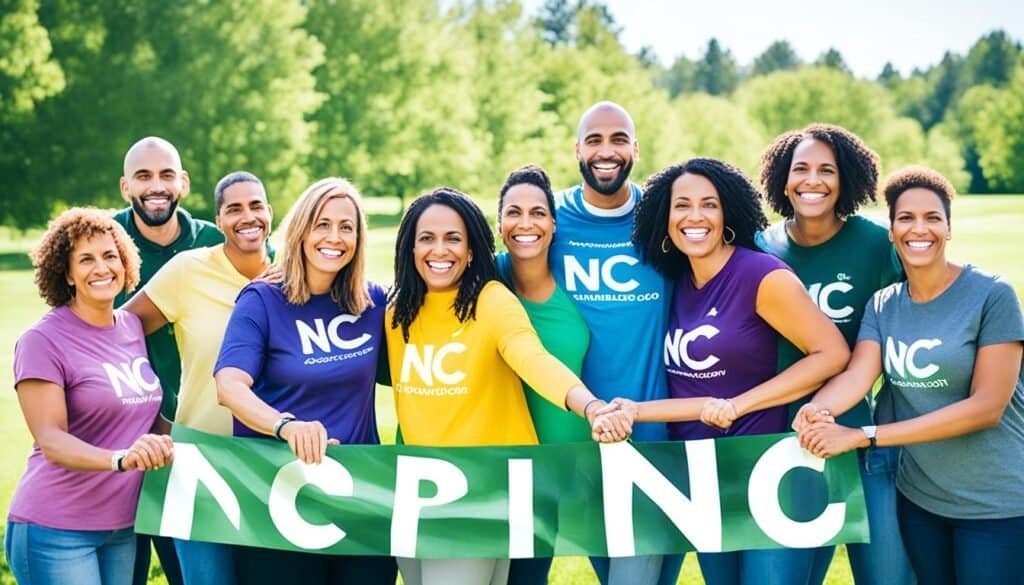National Certified Counselor (NCC)
Did you know that becoming a National Certified Counselor (NCC) can open doors to a rewarding and impactful career in counseling? With the increasing demand for qualified mental health professionals, earning the NCC certification can set you apart and provide you with the necessary skills and credentials to make a difference in people’s lives.
As a highly esteemed counseling certification, the NCC program is designed to ensure that counselors meet rigorous educational, training, and examination requirements. By obtaining this certification, you demonstrate your commitment to excellence in counseling and your adherence to the highest standards of professional practice. Let’s explore the process of becoming an NCC and the wide range of benefits it offers for your career and the counseling profession as a whole.
Key Takeaways:
- NCC certification is a prestigious credential that sets counselors apart in the field of mental health.
- Obtaining NCC certification requires meeting specific educational, training, and examination requirements.
- NCC certification provides numerous benefits, including enhanced professional reputation and increased opportunities for career advancement.
- NBCC also offers specialty certifications for counselors in clinical mental health, school counseling, and addictions counseling.
- By joining NBCC’s grassroots network, counselors can actively engage in counseling advocacy efforts and support the profession.
Eligibility Requirements for NCC Certification
To obtain certification as an NCC, counselors must meet the following eligibility requirements:
| Eligibility Requirements | Description |
|---|---|
| Counseling Degree | Hold a master’s, education specialist, certificate of advanced study, or doctoral degree in counseling from a CACREP-accredited program or an institutionally accredited educational institution. |
| Coursework | Complete specific coursework in areas such as human growth and development, cultural foundations in counseling, group counseling, and career counseling. |
| Counseling Supervision | Document at least 100 hours of postgraduate counseling supervision over a minimum 24-month period. |
| Counseling Work Experience | Provide evidence of at least 3,000 hours of postgraduate counseling work experience over a minimum 24-month period. |
| Professional Endorsement | Obtain endorsement from a professional colleague in a mental health field. |
| Ethics | Adhere to NBCC’s ethical policies. |
| Examination Requirement | Pass the NCE or NCMHCE. |
These eligibility requirements ensure that counselors have the necessary education, training, and experience to provide quality counseling services and uphold the standards set by the National Board for Certified Counselors (NBCC).
Application Process for NCC Certification
Becoming a National Certified Counselor (NCC) involves a straightforward application process that consists of the following steps:
- Complete the Application
- Pay Certification Fees
- Submit Documentation
Let’s take a closer look at each step to ensure a smooth NCC application process.
Step 1: Complete the Application
To begin the NCC certification journey, applicants must carefully complete the official application. The application form collects essential information about educational background, work experience, and other relevant details. It is crucial to provide accurate and comprehensive information to expedite the review process.
Step 2: Pay Certification Fees
As part of the NCC application process, candidates are required to pay the necessary certification fees. These fees cover the administrative costs associated with reviewing applications and maintaining the certification program. Certification fees may vary depending on whether or not exam registration is included. It is important to review the current fee structure to ensure timely submission of payment.
Step 3: Submit Documentation
Along with the completed application and payment of fees, applicants must provide documentation of their eligibility requirements. This documentation may include educational transcripts, supervision records, work experience verification, professional endorsement, and adherence to ethical policies. Ensuring all necessary documents are included will help expedite the review process and avoid potential delays in certification.
“The application process for NCC certification involves completing an application, paying the certification fees, and providing documentation of eligibility requirements.”
By following these three crucial steps, aspiring counselors can navigate the NCC application process with confidence, setting themselves on the path to obtaining this prestigious certification.
| Step | Action | Details |
|---|---|---|
| Step 1 | Complete the Application | Provide accurate and detailed information about education and work experience. |
| Step 2 | Pay Certification Fees | Submit the appropriate payment for certification processing. |
| Step 3 | Submit Documentation | Include all necessary documentation to support eligibility requirements. |
Benefits of NCC Certification
NCC certification offers numerous benefits to counselors, enabling them to thrive professionally and make a positive impact on their clients and the counseling profession as a whole. Here are some of the key benefits:
1. Professional Reputation and Credibility
Earning NCC certification demonstrates to colleagues and the public that counselors have met rigorous national standards of excellence in counseling. This certification enhances their professional reputation and credibility, positioning them as trusted experts in their field.
2. Personal Accomplishment and Professional Development
Obtaining NCC certification provides a profound sense of personal accomplishment, affirming the counselor’s dedication to continuous growth and improvement. The certification process encourages ongoing professional development, fostering a commitment to staying updated with the latest advancements in counseling practice.
3. Code of Ethics and Ethical Practice
NCC certification ensures that counselors adhere to a strict Code of Ethics, promoting ethical and responsible counseling practices. This commitment to ethical conduct not only protects clients but also upholds the integrity of the counseling profession.
4. Career Advancement and Increased Earnings
NCC certification can open doors to new career opportunities and advancements. Many employers and organizations prioritize hiring certified counselors, recognizing the value and expertise they bring to the table. Additionally, NCC certification may contribute to increased earning potential for counselors.
5. Contribution to Counseling Advocacy
By becoming NCC-certified, counselors have the opportunity to actively participate in advocacy efforts for the counseling profession. They can contribute their insights, expertise, and experiences to initiatives aimed at promoting the importance of counseling in society and enhancing access to quality mental health care.
The benefits of NCC certification extend beyond personal achievements and professional development. Certified counselors play a vital role in upholding the highest standards of counseling practice, promoting mental health and well-being.
| Benefits of NCC Certification |
|---|
| Demonstrates professional reputation and credibility |
| Provides a sense of personal accomplishment |
| Offers the protection of an enforceable Code of Ethics |
| Facilitates career advancement and increased earnings |
| Allows contribution to counseling advocacy efforts |
Specialty Certifications Offered by NBCC
In addition to the NCC certification, NBCC offers three specialty certifications for counselors:
- Certified Clinical Mental Health Counselor (CCMHC)
- National Certified School Counselor (NCSC)
- Master Addictions Counselor (MAC)
These specialty certifications allow counselors to demonstrate their expertise in specific areas of counseling practice. Counselors who earn these certifications can expand their knowledge and skills to better serve clients with specialized needs.
A table is provided below to highlight the key features and requirements of each specialty certification:
| Specialty Certification | Key Features | Requirements |
|---|---|---|
| Certified Clinical Mental Health Counselor (CCMHC) | Focuses on advanced clinical knowledge and skills for counselors in mental health settings. |
|
| National Certified School Counselor (NCSC) | Designed for counselors working in school settings to enhance their ability to support students academically, socially, and emotionally. |
|
| Master Addictions Counselor (MAC) | Focused on specialized knowledge and skills in the treatment of individuals struggling with various addictions. |
|
Specialty certifications provide counselors with the opportunity to enhance their expertise and distinguish themselves in specific areas of counseling practice. By earning these certifications, counselors can demonstrate their commitment to professional development and stay current with the latest research and best practices in their chosen specialty.
How to Become an NCC: Step-by-Step Process
To become a National Certified Counselor (NCC), counselors must follow a step-by-step process that includes:
- Holding an Eligible Degree: Counselors must possess a master’s, education specialist, certificate of advanced study, or doctoral degree in counseling from a CACREP-accredited program or an institutionally accredited educational institution.
- Earning a Passing Examination Score: Counselors must achieve a passing score on either the National Counselor Examination (NCE) or the National Clinical Mental Health Counseling Examination (NCMHCE) to demonstrate their knowledge and competency in the field.
- Meeting Supervision and Work Experience Requirements: Counselors must document at least 100 hours of postgraduate counseling supervision over a minimum 24-month period. They also need to provide evidence of at least 3,000 hours of postgraduate counseling work experience over a minimum 24-month period.
- Complying with Conduct Standards: Counselors seeking NCC certification must adhere to the ethical guidelines and conduct standards set forth by the National Board for Certified Counselors, Inc. (NBCC).
By successfully completing each step of the process, counselors can attain NCC certification, demonstrating their professionalism and commitment to excellence in the counseling profession.
Government Affairs Initiatives by NBCC
The National Board for Certified Counselors (NBCC) is deeply committed to supporting the counseling profession through various government affairs initiatives. These initiatives aim to advocate for counselor employment, increase recognition and inclusion in important healthcare programs, and establish advocacy programs to further the profession’s goals.
Advocating for Improved Counselor Employment
One of the key initiatives undertaken by NBCC is the advocacy for improved counselor employment opportunities. NBCC actively engages with the Department of Veterans Affairs to promote the hiring of counselors, ensuring that veterans receive the mental health support they need. By advocating for the inclusion of counselors in the Medicare program, NBCC aims to expand access to counseling services for individuals across the nation.
Recognition by the Military Health Systems
“We believe that counselors play a vital role in providing mental health support to military personnel and their families. Therefore, NBCC strives for increased recognition by the Military Health Systems to ensure counselors are acknowledged and valued within the healthcare system.”
Creation of a Federal Occupational Series for Counselors
To further elevate the status and recognition of counselors, NBCC is working towards the creation of a dedicated Federal Occupational Series for Counselors. This series will establish standardized qualifications, job titles, and career pathways for counselors within the federal government, ensuring that their expertise is recognized and utilized to its fullest potential.
Support for Advocacy Programs
In addition to government-level initiatives, NBCC places a strong emphasis on supporting advocacy programs that promote the counseling profession. One such program is the Minority Fellowship Program, which aims to increase the representation of underrepresented populations in the counseling field. By providing financial support, mentorship, and resources, NBCC actively contributes to the development and success of counselors from diverse backgrounds.
| Initiative | Description |
|---|---|
| Advocacy for Improved Counselor Employment | Engaging with the Department of Veterans Affairs to promote counselor hiring and advocating for counselor inclusion in the Medicare program. |
| Recognition by the Military Health Systems | Striving for increased recognition of counselors within the Military Health Systems to ensure their importance and expertise are valued. |
| Creation of a Federal Occupational Series for Counselors | Working towards establishing a dedicated series for counselors within the federal government, establishing standardized qualifications and career pathways. |
| Support for Advocacy Programs | Providing support to advocacy programs, such as the Minority Fellowship Program, to increase diversity and representation within the counseling profession. |
Grassroots Network and Counseling Advocacy
NBCC’s grassroots network provides a platform for National Certified Counselors (NCCs) to actively engage in counseling advocacy and support the profession. With a shared passion for promoting the well-being of individuals and communities, NCCs in the grassroots network are empowered to make a meaningful impact on legislative decisions and policies that shape the field of counseling.
By joining the grassroots network, counselors can stay informed about important issues, connect with like-minded professionals, and contribute to the development and implementation of effective strategies that promote and support the counseling profession.
“Being part of the NBCC grassroots network has been an empowering experience. It allows me to advocate for the needs of our profession and be a voice for those who rely on counseling services. It’s about making a difference, one legislative action at a time.” – Dr. Emily Mitchell, NCC
The grassroots network provides opportunities for counselor involvement in various advocacy efforts, including:
- Supporting the passage of bills that expand access to quality mental health services
- Advocating for equitable reimbursement rates for counseling services
- Promoting legislation that embraces diversity, cultural competency, and social justice
- Engaging with legislators to educate them on the importance of counseling in addressing mental health and wellness
Legislative Support
Legislative support is crucial for advancing the counseling profession and ensuring access to quality mental health care for individuals in need. The grassroots network equips counselors with the knowledge, resources, and tools to effectively communicate with their legislators and advocate for policy changes that positively impact the counseling community.
Through legislative support, NCCs can drive change and create a more supportive and inclusive environment for both counselors and their clients. By actively participating in advocacy initiatives and engaging in dialogue with lawmakers, counselors contribute to the ongoing growth and development of the counseling profession.
| Benefits of Grassroots Network | How to Get Involved |
|---|---|
|
|
By actively participating in the grassroots network, counselors strengthen the collective voice of the counseling profession and contribute to a thriving and impactful community dedicated to counseling advocacy.

Additional Resources and Support for Counselors
NBCC understands the importance of providing counselors with resources and support beyond certification. As part of their commitment to the counseling profession, NBCC offers a variety of valuable resources to assist counselors in their professional journey.
State Licensure Board Directory
Counselors often face the challenge of navigating the complex requirements for state licensure. To ease this process, NBCC provides a comprehensive state licensure board directory. This directory offers counselors a centralized resource to access information about licensure requirements specific to their state. By using this directory, counselors can stay informed and ensure compliance with state regulations.
Professional Liability Insurance
As counseling professionals, it’s crucial to prioritize your own protection. NBCC has partnered with CM&F Group to offer counselors access to discounted professional liability insurance. This insurance coverage provides counselors with financial security and peace of mind in the event of a liability claim. By taking advantage of this partnership, counselors can protect themselves while focusing on delivering high-quality care to their clients.
Resources for Helping Ukraine
In times of crisis, counselors have the unique opportunity to provide support to communities in need. NBCC encourages counselors to participate in humanitarian efforts, such as assisting the people of Ukraine. Organizations like UNICEF and the Red Cross play a vital role in delivering aid and support to those affected. By getting involved, counselors can make a meaningful impact and help alleviate the challenges faced by individuals and families in Ukraine.
To learn more about these resources and support initiatives, visit the NBCC website.
| Resource | Description |
|---|---|
| State Licensure Board Directory | A centralized resource providing information about state licensure requirements specific to each state. |
| Professional Liability Insurance | Discounted insurance coverage through a partnership with CM&F Group, offering financial protection in the event of a liability claim. |
| Resources for Helping Ukraine | Information on how counselors can contribute to humanitarian efforts in Ukraine through organizations like UNICEF and the Red Cross. |
Conclusion
NCC certification is the culmination of a counselor’s dedication to professionalism, ongoing professional development, and a commitment to excellence in the field of counseling. This prestigious credential signifies that a counselor has met rigorous standards and possesses the necessary knowledge and skills to provide effective counseling services.
Obtaining NCC certification is a significant accomplishment that demonstrates a counselor’s commitment to continuous growth and learning. By pursuing this certification, counselors have the opportunity to expand their knowledge, enhance their professional development, and stay current with the latest advancements in the counseling profession.
Furthermore, NCC certification provides counselors with a competitive edge in the industry. It distinguishes them as highly qualified professionals and can open doors to new career opportunities and increased earning potential. The NCC credential also gives counselors a sense of pride, validation, and recognition for their dedication to their clients and the counseling profession.
FAQ
What is NCC certification?
NCC certification stands for National Certified Counselor certification. It is a credential offered by the National Board for Certified Counselors, Inc. (NBCC) to counselors who have met specific educational and training requirements and passed the National Counselor Examination (NCE) or the National Clinical Mental Health Counseling Examination (NCMHCE).
What are the eligibility requirements for NCC certification?
To be eligible for NCC certification, counselors must hold a counseling degree from a CACREP-accredited program or an institutionally accredited educational institution, complete specific coursework, document counseling supervision and work experience, obtain endorsement from a professional colleague, adhere to NBCC’s ethical policies, and pass the NCE or NCMHCE.
How do I apply for NCC certification?
The application process for NCC certification involves completing an application, paying the certification fees, and providing documentation of eligibility requirements. The fees for NCC certification vary depending on whether or not exam registration is included. The NCE and NCMHCE examinations are offered throughout the year.
What are the benefits of NCC certification?
NCC certification offers numerous benefits to counselors, including demonstrating high national standards for counseling, enhancing professional reputation and credibility, providing a sense of personal accomplishment, offering the protection of an enforceable Code of Ethics, demonstrating a commitment to continued professional development, increasing opportunities for career advancement and increased earnings, and providing opportunities to contribute to advocacy efforts for the counseling profession.
What specialty certifications are offered by NBCC?
NBCC offers three specialty certifications for counselors: Certified Clinical Mental Health Counselor (CCMHC), National Certified School Counselor (NCSC), and Master Addictions Counselor (MAC). These certifications allow counselors to demonstrate their expertise in specific areas of counseling practice.
What is the step-by-step process to become an NCC?
To become an NCC, counselors must hold an eligible counseling degree, earn a passing score on the NCE or NCMHCE, meet supervision and work experience requirements, and comply with conduct standards, including ethical guidelines.
What government affairs initiatives does NBCC support?
NBCC is actively involved in various government affairs initiatives to support the counseling profession. Some of these initiatives include advocating for improved counselor employment, inclusion of counselors in the Medicare program, increased recognition by the Military Health Systems, the creation of a Federal Occupational Series for Counselors, and support for advocacy programs such as the Minority Fellowship Program.
How can counselors get involved in counseling advocacy?
Counselors can join NBCC’s grassroots network to stay updated on important issues, contact their legislators, and help pass measures that promote and support the counseling profession.
What additional resources and support does NBCC provide for counselors?
NBCC provides additional resources and support for counselors, including a state licensure board directory to help counselors navigate licensure requirements, access to discounted professional liability insurance, and information on how counselors can help the people of Ukraine through organizations like UNICEF and the Red Cross.
Why should I pursue NCC certification?
NCC certification is a prestigious credential that signifies a counselor’s commitment to professionalism, ongoing education, and the highest standards of ethical practice. By obtaining NCC certification, counselors can elevate their professional status and demonstrate their expertise in the field of counseling.






